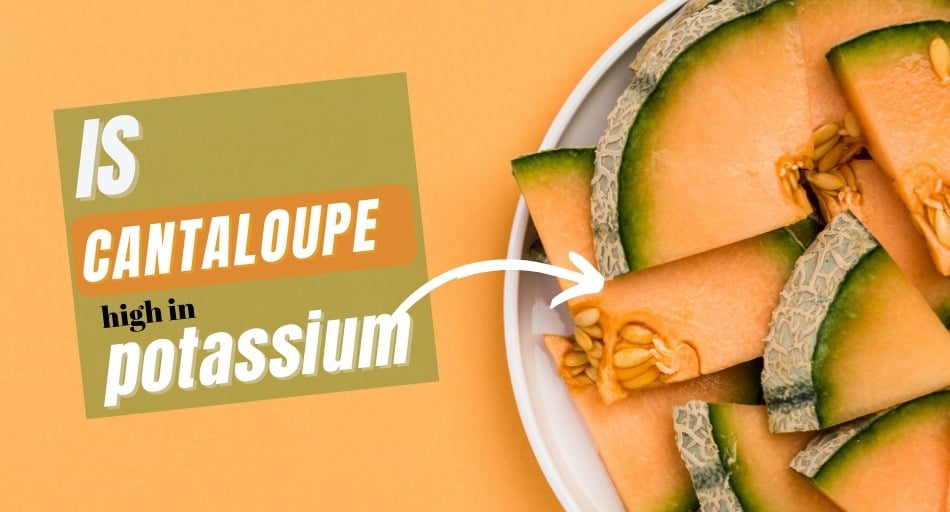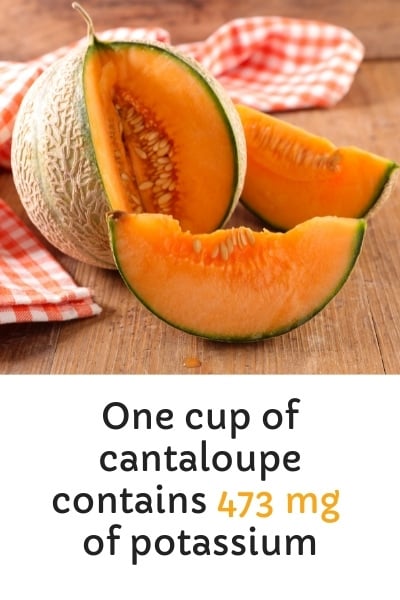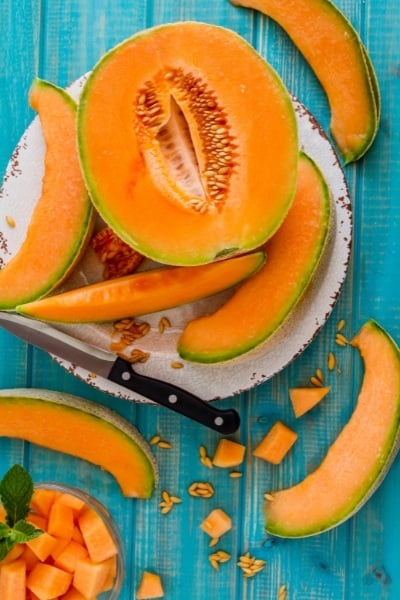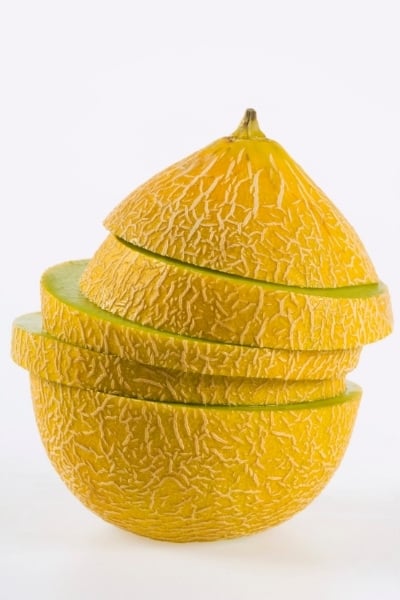Cantaloupe may not be as popular as other melon kinds, but it should be. It’s delicious, nutritious, and easily accessible in most grocery stores.

It’s loaded in various minerals and vitamins, including potassium, which contributes to optimal health.
But, if you have to be careful about how much potassium you’re taking in, you should be aware of the content of this mineral in common fruits.
So, is cantaloupe high in potassium? Should you eat it on a low-potassium diet?
Table of Contents
Is cantaloupe high in potassium?
Cantaloupe contains quite a lot of potassium in a single serving. Because of that, it’s not a very suitable fruit to add to a low-potassium diet if you suffer from a potassium sensitivity of kidney disease.
Eating cantaloupe can help other people stay hydrated and load on essential nutrients, vitamins, and minerals. Cantaloupe is also a delicious fruit that’s easy to add to any diet.
Can You Check Your Potassium Level at Home?
How much potassium is in cantaloupe?
One cup of cantaloupe contains 473 mg of potassium. This is way more than 200 mg of this mineral in a single serving.
So, people especially sensitive to potassium should limit or remove cantaloupe from their diets altogether.
Whether and how much cantaloupe you can consume on a low-potassium diet depends on how strict it is.

So, always make sure to talk to your doctor if you have any doubts about your health.
For those looking to boost their mineral intake, eating cantaloupe can be a great way to do so.
It’s not only high in potassium but also other minerals that work as electrolytes.
As a result, eating this type of melon can help replenish nutrients after working out and excessive dehydration.
Is cantaloupe healthy?
Just like most fruits, most of the calories in cantaloupe come from carbohydrates. It does contain quite a lot of sugar, but it’s still a good source of fiber.
This type of carb is not only important for good digestion (including soaking up excess stomach acid, aiding in heartburn), but it might also help lower your blood sugar levels.
This prevents spikes in your blood sugar and reduces the risk of type 2 diabetes. As a result, eating fruits like cantaloupe can help improve your health.
Cantaloupe contains a great amount of beta-carotene – a type of carotenoid that gives the fruit its pigment.
Once digested, beta-carotene is turned into vitamin A, which is a powerful antioxidant.
These compounds help flush out harmful free radicals from your body, preventing oxidative damage and stress to your cells.

This, in turn, prevents various chronic conditions like heart disease, cancer, and diabetes.
Vitamin A also improves the health of your eyes, red blood cells, and immune system, so it’s important for everyone.
Almost 90% of cantaloupe is water. So, eating this type of melon can help you stay hydrated. Good hydration prevents indigestion, kidney disease, and high blood pressure.
Consuming lots of fruits and veggies with a high water content can also help you lose weight, as it contributes to the feeling of fullness after eating.
Not getting enough water can make you dizzy and tired and lead to various serious health conditions.
So, it’s important to include high-water foods like a cantaloupe in your diet.
Cantaloupe also contains a great dose of vitamin C. This micronutrient works as a powerful antioxidant, just like vitamin A, but it also has many other health benefits.
Also referred to as ascorbic acid, vitamin C helps with the growth, development, and repair of all the cells and tissues in your body.
It also helps absorb iron and form collagen, which makes it a great vitamin for improving your skin’s health.
A single serving of cantaloupe contains way more than your daily recommended need for vitamin C, so eating this fruit can help you load up on this nutrient.
Can you take in too much potassium from cantaloupe?
Cantaloupe is high in potassium. So, if you have to consume less potassium than the standard recommended value, you might want to choose other low-potassium fruit, such as apples, blueberries, blackberries, or grapes.
If you absolutely can’t live without having this type of melon in your diet, try eating it in smaller quantities or talk to your healthcare provider about how best to incorporate it into a low-potassium diet.
Is cantaloupe juice high in potassium?

Just one cup of cantaloupe juice contains 635 mg of potassium. This is quite a lot considering it only has 81 calories.
As a result, people with potassium sensitivity and those following a low-potassium diet should avoid cantaloupe juice as well as juices from other melons.
What’s more, these juices tend to be high in sugar, which contributes to weight gain and increases your risk of type 2 diabetes.
So, make sure to dilute most juices with water to reduce the risk of these conditions.
On the other hand, adding some cantaloupe juice to your diet is an excellent idea if you want to increase your potassium intake.
Cantaloupe juice also provides you with a lot of vitamin A and vitamin C, making it even more nutritious.
Also, it’s very easy to add to your diet, even easier than a raw cantaloupe. After all, drinking a glass of juice is a simple thing to do, no matter how busy you are.
Is honeydew melon high in potassium?

Honeydew is very similar to cantaloupe, as they’re both from the same melon family. Honeydew melon contains 404 mg of potassium in one cup of this fruit.
It’s slightly lower, so if you’re eating a half-cup serving, you should be able to add some of this melon to a low-potassium diet.
Just like cantaloupe, honeydew melon is also high in several nutrients, minerals, and vitamins, helping you stay healthy.
Conclusion
Cantaloupe melon is rather high in potassium, which means that you should be careful about consuming too much if you follow a low-potassium diet.
On the other hand, this delicious and hydrating melon can help you load up on this mineral in a very easy and effortless way.
So, whether eating cantaloupe is good for you depends on your dietary requirements.
Don't know which foods are high in potassium? Read our article, 15 Best Food Sources of Potassium. We also have a guide to this important mineral: Potassium 101: All You Need To Know About Potassium.
